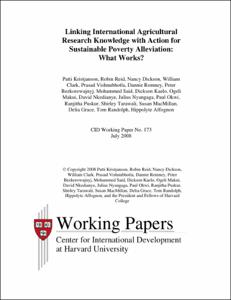Location
The Center for International Development (CID) at Harvard University is a university-wide center that works to advance the understanding of development challenges and offer viable solutions to problems of global poverty. CID is Harvard’s leading research hub focusing on resolving the dilemmas of public policy associated with generating stable, shared, and sustainable prosperity in developing countries. Our ongoing mission is to apply knowledge to and revolutionize the world of development practice.
CID's primary activities and programs seek to:
- Change the way in which growth strategies are conceived, designed, and implemented
- Reinvent development policy to facilitate countries’ move to higher productivity activities
- Extend markets to the underserved and empower the disenfranchised
- Improve service delivery in education, health, and other social services
- Design institutions, policies and practices that promote sustainable development which meet human needs while conserving the earth’s life support systems
In order to effectively address the world’s most intractable problems, CID seeks to bridge the gaps between disciplines. By convening Harvard’s leading experts and engaging colleagues throughout the world, CID pursues the science of explaining the sources of and remedies for entrenched global poverty, and the political and environmental circumstances that surround it.
Members:
Resources
Displaying 1 - 4 of 4Linking international agricultural research knowledge with action for sustainable poverty alleviation: what works?
Whose Security? Deepening Social Conflict over ‘Customary’ Land in the Shadow of Land Tenure Reform in Malawi
Malawi, like other countries in Africa, has a new land policy designed to clarify and formalise customary tenure. The country is poor with a high population density, highly dependent on agriculture, and the research sites are matrilineal-matrilocal, and near urban centres. But the case raises issues relevant to land tenure reform elsewhere: the role of ‘traditional authorities’ or chiefs vis-a-vis the state and ‘community’; variability in types of ‘customary’ tenure; and deepening inequality within rural populations.
Challenges in Land Tenure and Land Reform in Africa: An Anthropological Perspective
The paper discusses the interface of anthropological research on land with policy positions across formative periods – from the colonial period through to the present as land tenure reform has repeatedly become a development priority; and recent research on intensifying competition over land, its intersection with competition over legitimate authority, new types of land transfers, the role of claims of indigeneity or autochthony in land conflicts, and the challenges of increasing social inequality and of commodification of land for analysis and for land reform.




